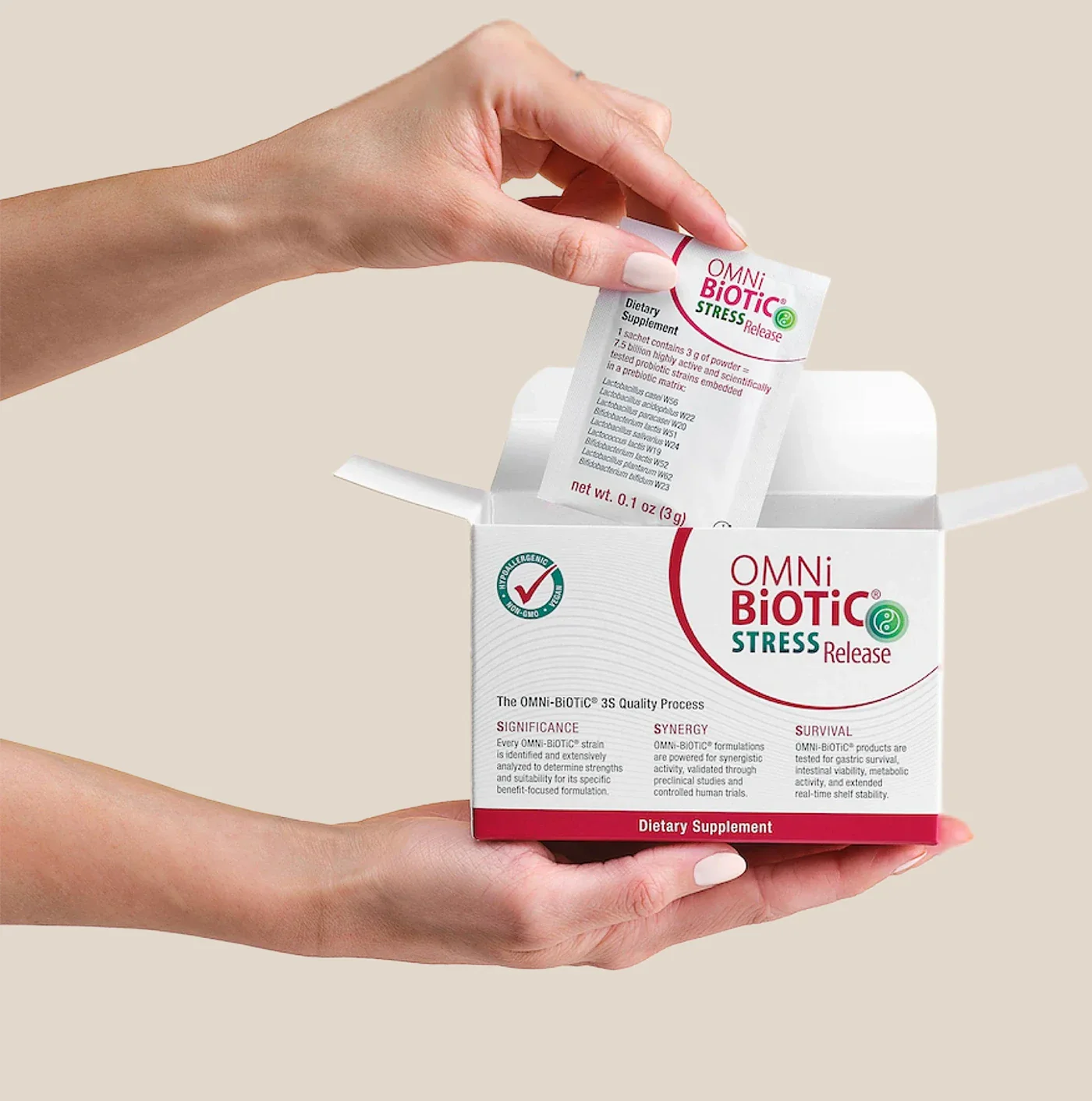Fiber and Probiotics: Better Together?
Probiotics and fiber are both critical for digestion and can improve common digestive ailments. Dietary fiber comes from plant foods and promotes digestive regularity. Some specialized types of fiber, called prebiotics, provide a food source for gut bacteria and may enhance the effects of probiotics.
Probiotics are beneficial bacteria found in dietary supplements and some foods. Fiber and probiotics can work together to support a healthy, balanced gut microbiome, which is critical for digestive and overall health.
If you suffer from common digestive issues like constipation, gas and bloating, or diarrhea, you may have heard the advice to increase your fiber intake. Consuming adequate dietary fiber can improve your digestion and help with common gastrointestinal ailments.
You may have also heard of using probiotics, live good bacteria, to improve gut health. But what about taking probiotics and fiber together? Certain types of fiber can work in tandem with probiotics to benefit digestive health, and this combination can be a key element of a probiotic and fiber diet.
How Fiber and Probiotics Support One Another
Eating more fiber has been linked to improved digestive and overall health. High-fiber diets can prevent or relieve constipation and also reduce the risk of several chronic diseases. Unfortunately, many of our diets are too low in fiber due to a lack of whole plant foods and an over-reliance on animal products and highly processed foods.
Estimates indicate that 95% of Americans don’t meet the recommended dietary fiber intake of 19-38 grams daily. Western-style diets, including the typical U.S. diet, are also associated with lower diversity of beneficial gut microbes compared to diets higher in fiber from plant foods.
Dietary fiber is typically categorized into soluble and insoluble forms. Both are important for digestive health. Soluble fiber can dissolve in water to form a gel and helps to soften the stool. It also slows nutrient absorption and increases satiety. Insoluble fiber provides bulk for easier passage of stool. Most foods provide a mix of fiber types.
Common types of fiber include:
Insoluble sources: Cellulose, hemicellulose, and lignin, found mainly in vegetables and whole grains.
Soluble sources: Pectin, gums, and mucilages; pectins are found primarily in fruits and vegetables, whereas gums and mucilages are mainly extracted from plants for use in processed foods.
Probiotics are specific types of soluble fiber that pass undigested through the upper gastrointestinal tract and go on to provide nourishment for the beneficial bacteria in the colon. They can work together with probiotics, a direct source of live beneficial bacteria. Prebiotics act as the food source for our gut bacteria, whereas probiotic supplements deliver live, beneficial bacteria to the gut to support balanced and diverse gut flora.
What are the Benefits of Combining Fiber with Probiotics?
Both probiotics and dietary fiber can be beneficial for digestive health. But what happens when you combine them?
The Role of Probiotics
Probiotics offer many benefits for digestive health, including enhanced digestion, protection against bad bacteria, and a reduction in digestive symptoms like diarrhea and constipation.
Although some foods, such as yogurt, kefir, sauerkraut, kimchi, and kombucha, are cultured with or have added probiotics, not all probiotic foods have enough live bacteria to survive the digestive system to provide health benefits. They may also not have the right combination of strains to have a lasting impact on your gut health.
On the other hand, probiotic supplements typically provide information on the CFU (colony-forming units) per gram of live active microorganisms, which ideally will be 107 to 1011.
Finding a product with multiple strains of beneficial bacteria may be preferable since much of the research on common digestive issues, such as antibiotic-associated diarrhea and symptoms of irritable bowel syndrome, has used multi-strain products.
Adequate fiber intake is critical for digestive health; it keeps your gastrointestinal tract moving and your bowel movements regular and helps prevent chronic conditions.
Increasing your intake of whole plant foods high in fiber, including whole grains, fruits, vegetables, legumes, nuts, and seeds, will provide a variety of insoluble and soluble dietary fibers, along with other crucial nutrients and beneficial plant compounds.
Fiber supplements can be helpful if you’re looking to add a specific fiber source. Some varieties of fiber offer more benefits than others, depending on your health goals.
Combining Probiotics and Fiber
If you’re supplementing both probiotics and additional fiber, it’s typically best to take them separately since some of the beneficial bacteria can adhere to the fiber and be eliminated rather than absorbed.
Prebiotic fibers work with the good bacteria in the digestive system by increasing their numbers and activity, including their ability to support immunity and maintain the gut barrier against harmful pathogens. Prebiotics can also enhance the benefits of probiotics.
It’s preferable not to take probiotics and prebiotic fiber simultaneously because if the probiotics ferment the prebiotics too soon, this can cause bothersome symptoms like abdominal pain and bloating.
Synbiotics designed to be combined are the exception.
Synbiotics are combination products that typically contain probiotics with a prebiotic, most commonly inulin, GOS, or FOS, that supports its beneficial health effects. Research has found that synbiotics can enhance the microbiota, increasing beneficial Bifidobacteria and Lactobacilli.
The goal of a synbiotic is to maximize the health impact of both the good bacteria and the prebiotic fiber by providing them together. The amount of fiber in synbiotics varies, from very small quantities to larger amounts. Look for products that provide an optimal blend of probiotics with prebiotics.
Omni-Biotics’ probiotic products are all synbiotics. Each Omni-Biotic probiotic contains prebiotic nutrients specifically selected for the probiotic strains in the formulation. These prebiotic fibers act as the food source for the specific probiotic bacteria in the Omni-Biotic powder. When Omni-Biotic probiotics are dissolved in water prior to intake, the probiotic bacteria rehydrate and consume these prebiotic fibers. This makes them strong for their passage through the GI tract, ensuring they arrive in the intestine alive and metabolically active.
Is it Better to Take Prebiotics or Another Kind of Fiber?
Although all prebiotics are considered fiber, not all dietary fibers have prebiotic effects.
The benefits of prebiotics for digestion go beyond those of standard fiber since they nourish beneficial bacteria, leading to a healthier, more balanced gut microbiome.
Though humans have been consuming prebiotics in food since prehistoric times, research has uncovered their health benefits much more recently. Well-studied prebiotics include inulin, galactooligosaccharides (GOS), fructooligosaccharides (FOS), and resistant starch.
Probiotics are found naturally in some plant foods like chicory, artichokes, asparagus, onions, garlic, whole wheat, oats, and barley, as well as in some processed foods with added prebiotics. They are also available as supplements.
Prebiotics target good bacteria in the colon, particularly Bifidobacteria. Research has found that consumption of the prebiotics inulin, FOS, resistant starch, and GOS significantly increased levels of Bifidobacteria and other beneficial gut bacteria.
The benefits to gut flora are specific to fiber with prebiotic effects. A recent analysis of randomized controlled trials found that prebiotic fiber supplements lead to significantly higher counts of Bifidobacteria and Lactobacilli than non-prebiotic fiber supplements.
In addition to enhancing their diversity and activity, prebiotics can increase the gut bacteria’s production of short-chain fatty acids. These acids are critical in supporting the gut barrier and lowering colon pH. In turn, this promotes the growth of beneficial bacteria and inhibits gut pathogens. Enhanced production of short-chain fatty acids ensures adequate absorption of fluids and electrolytes in the colon and promotes intestinal motility.
Some prebiotics are more easily digested than others. Some, such as inulin and fructooligosaccharides, may not be well tolerated in larger doses and can cause digestive side effects such as gas, bloating, and diarrhea.
These symptoms may be temporary as your digestive tract adapts. To limit digestive upset, increase new fiber sources slowly and drink plenty of water to help move the fiber through your system.
There are various prebiotic supplements available. Since different prebiotics affect different strains of good bacteria, it’s optimal to take in a variety of prebiotics. A mixture of prebiotics may also most effectively support the beneficial actions of gut bacteria, like the production of short-chain fatty acids.
Omni-Biotic offers two different prebiotic options containing various beneficial fiber sources to meet your individual needs.
Fiber vs. Probiotics for Constipation
Constipation, infrequent or difficult bowel movements, often of small, hard stools, is a common problem affecting both adults and children.
A lack of fiber and fluids can lead to constipation. Increasing fiber intake adds bulk and fluids to stool, making them softer and leading to easier passage and improved regularity.
Insoluble fibers, such as those found in whole grains, vegetables, beans, nuts, and fruits, are most effective for adding bulk to stool. For fiber supplements, however, experts frequently recommend soluble fibers such as psyllium for constipation and irritable bowel syndrome due to their ability to hold fluid and lead to softer stools.
Patients with constipation have been found in some studies to have lower levels of beneficial Bifidobacteria and Lactobacilli. Several studies providing various species of Bifidobacteria probiotics found that they improved subjects’ constipation.
Prebiotic inulin has also been found to relieve constipation in some studies with adults and children. Additionally, several synbiotics with various combinations of Bifidobacteria, Lactobacilli, and the prebiotic fibers FOS, GOS, and inulin have also been found to improve constipation.
Omni-Biotic Balance is a synbiotic with multiple strains of beneficial bacteria selected to optimize digestion and reduce constipation. It includes species found to support the protective gut barrier, enhancing its mucus production and improving gut motility. It also provides small amounts of the prebiotics FOS and inulin to enhance its effects.
Fiber vs. Probiotics for Diarrhea
Diarrhea can have many causes, some acute such as infections, food poisoning, or traveler’s diarrhea, and some chronic, including food intolerances or chronic gastrointestinal conditions.
Probiotics, particularly Bifidobacteria and Lactobacilli species, have been found to improve infectious diarrhea, possibly due to their ability to fight off gastrointestinal pathogens by maintaining the gut barrier and for immune support.
In addition, some probiotic strains have been associated with a reduced risk of antibiotic-associated diarrhea. Containing 10 species of Lactobacilli and Bifidobacteria, Omni-Biotic AB 10 significantly reduced the risk of antibiotic-associated diarrhea in two separate studies in surgical patients and nursing home residents.
Some prebiotics can also help ward off diarrhea due to GI pathogens. Research has found that supplements of the prebiotic fibers GOS and inulin significantly reduced the risk of diarrhea in travelers to high-risk areas.
Combining probiotics and beneficial prebiotics may be especially effective for combatting certain types of diarrhea. In one study, adding prebiotic inulin to a strain of Bifidobacteria improved the resolution of infectious diarrhea in children. Research has also found that synbiotics prevented traveler’s diarrhea.
Fiber vs. Probiotics for Optimized Digestion
Gas and bloating are common symptoms of several common gastrointestinal conditions, including irritable bowel syndrome (IBS), small intestinal bacterial overgrowth (SIBO), constipation, and dietary intolerance. They can indicate an imbalance in the gut microbiome. lack of regularity resulting in constipation, diarrhea, or both, as can sometimes occur with IBS, can also indicate that your gut health is out of balance.
Probiotics and fiber can both play a part in reducing common gastrointestinal ailments and supporting a healthy gut.
Probiotics for Digestion
Various strains of both Bifidobacteria and Lactobacilli have been associated with improved microbial balance and better digestive health, including better regularity and a reduction in constipation, bloating, and other symptoms of irritable bowel syndrome.
A synbiotic composed of Lactobacillus, Bifidobacterium, and FOS was found to reduce digestive symptoms of lactose intolerance in one small study.
Prebiotics for Digestion
Research indicates that the prebiotics inulin and FOS can improve bowel regularity and gut barrier function. In some studies, prebiotic GOS supplements reduced some of the symptoms of patients with IBS.
Research has found that acacia fiber, a soluble fiber also known as gum arabic, may have prebiotic properties and can increase beneficial Lactobacilli and Bifidobacteria and their production of short-chain fatty acids. One study of patients with irritable bowel syndrome found that yogurt with acacia fiber and a strain of Bifidobacteria reduced their symptoms.
Omni-Biotic offers two prebiotic product options; Omni-Logic Immune provides acacia fiber and resistant starch, while Omni-Logic Plus provides FOS, GOS, and glucomannan.
The non-digestible fibers in prebiotics can cause side effects in sensitive individuals, including those with irritable bowel syndrome or other gastrointestinal conditions. If you have a chronic digestive condition, consult your healthcare provider or registered dietitian before trying new fiber sources or probiotics.
Key Takeaways
If you have ongoing bothersome gastrointestinal symptoms like diarrhea, gas, bloating, or constipation, it’s critical to seek health care from a qualified provider.
Upping your fiber intake can benefit many common digestive conditions by supporting regularity and nourishing beneficial gut bacteria, in the case of prebiotics.
Targeted use of probiotics can help balance your microbiome and lead to better digestive health, offering help for a variety of digestive ailments. Synbiotics can be a convenient way to enhance the health benefits of probiotics.Omni-Biotic offers a variety of supplements to meet your digestive health needs. For a multi-strain probiotic formula proven to help prevent certain types of diarrhea, consider Omni-Biotic AB 10. Omni-Biotic Balance, on the other hand, can help optimize digestion in cases of constipation. Consider Omni-Biotic’s prebiotic supplement line “Omni-Logic” for products with various beneficial fiber sources to optimize your gut health.














Post Comment